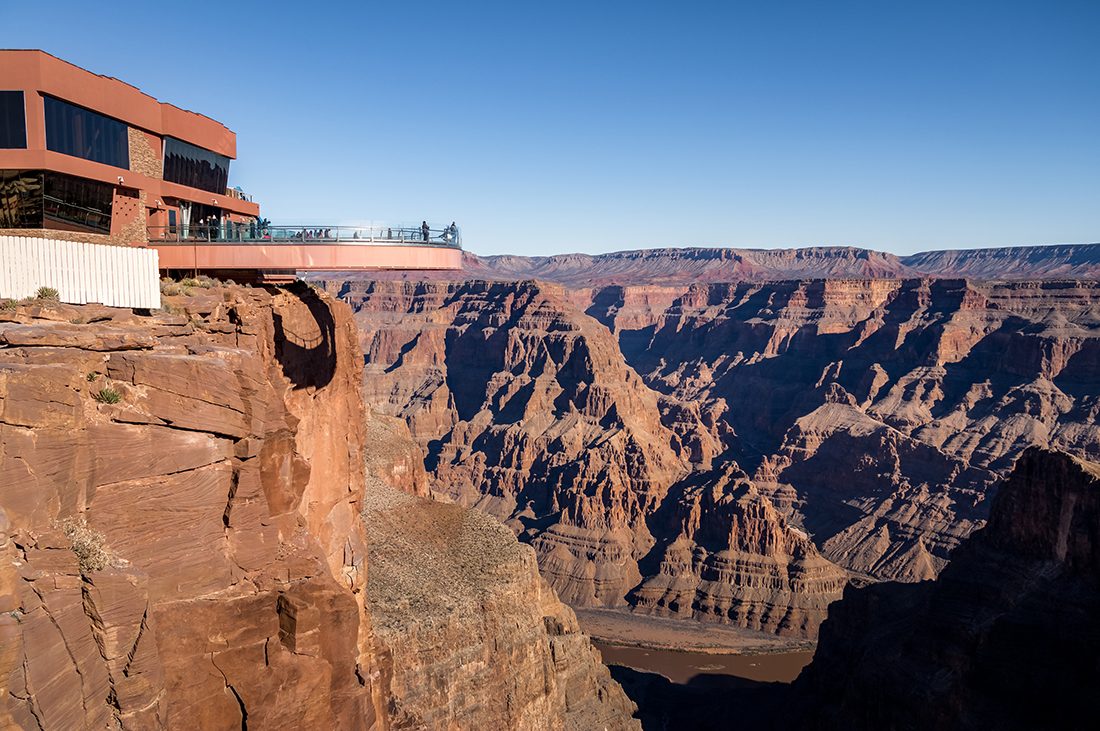|
With its soaring buttes, rippling rock faces and vast gorges, the Grand Canyon leaves visitors spellbound. Snaking through northern Arizona, this 277-mile-long natural wonder — 18 miles wide at its broadest point — is the handiwork of the Colorado River, which persistently wore a deep groove into the rock over the course of millions of years. At the bottom lies a layer of Vishnu Schist, some of the oldest exposed rock on Earth, at around two billion years old.
The Grand Canyon serves up different experiences and vantage points in its three distinct regions. Whether you’re interested in the easy access points of the South Rim, yearning for the tranquil solitude of the North Rim or eager to step onto the adrenaline-inducing Skywalk in Grand Canyon West, you’ll get your fill of outdoor adventure here.
Take It All in at the South Rim
Open year-round and accessible to all, the South Rim is the most popular area of the Grand Canyon, rolling out the welcome mat to 90 percent of all visitors. Tourists can reach the South Rim by driving from Flagstaff along Highway 180 to Highway 64. During this scenic drive, motorists will weave through the gorgeous Kaibab National Forest before arriving at Grand Canyon Village.
Located in Grand Canyon Village, the Grand Canyon Visitor Center sets the stage for your explorations with an informative video, interactive exhibits and historic artifacts that shed light on the region’s history. Just a short walk from the visitor center is Mather Point Overlook, the perfect spot from which to survey the canyon’s immensity. Gaze at rugged peaks and towering mesas, scan the North Rim in the distance or peer down to the bottom, almost a mile deep. Timely travelers can visit at sunrise or sunset to view enchanting colors as light and shadow dance across rock faces.
Getty Images/iStockphoto/Thinkstock
If you want to contemplate the canyon from a bird’s perspective, book a helicopter tour. High in the sky, visitors can get an eyeful of jagged outcroppings and staggering gorges as the tour guide shares knowledge about the sights below. For those who prefer to stay on the ground, Bright Angel Trail is a great way to explore the canyon by foot. Beginning at Grand Canyon Village, this popular 19-mile hike takes two days to complete and will lead you through the lush Garden Creek, Inner Gorge and see-through Bright Angel Suspension Bridge. The trail enjoys more shade than most other canyon paths, making it a suitable habitat for animals and plant life.
Find Solitude at the North Rim
Escape the crowds of the south by fleeing to the North Rim. Open from mid-May to October (it’s closed in winter because of snow), the remote North Rim is an oasis of peace and relaxation for those who venture off the beaten path. The area also opens up a drastically different side of the canyon. Standing 1,000 feet higher than the South Rim, the rugged landscape showcases luscious wildflower meadows and areas thick with aspen and spruce trees thanks to its cooler temperatures. Keep in mind that the journey to the North Rim is a 20-mile-plus hike or a five-hour drive from the South Rim. You’ll find the National Park entrance to the North Rim 30 miles south of Jacob Lake on Highway 67.
Hikers can experience all the North Rim has to offer on its many scenic trails. Short yet stunning, Bright Angel Point is a paved, one-mile trek that leads walkers to a glorious viewpoint overlooking the spectacular South Rim in the distance. Cape Royale Trail is another easy hike that ends with staggering panoramic views of the Grand Canyon. If you’re up for a challenge, the North Kaibab Trail waits for you. This tough 14-mile hike takes two days to complete and is the only North Rim trail that snakes into the canyon. From Roaring Springs Canyon and Supai Tunnel to Roaring Springs and Ribbon Falls, this strenuous but rewarding trek takes visitors through a wide variety of ecosystems. About 48 miles to the east of Grand Canyon Village, hikers will discover the Havasu Falls, a cascade that plunges 90 feet over the canyon walls.
Take a Walk on the Wild West Side
Confront your fear of heights at the Skywalk in Grand Canyon West. Located at Eagle Point, this horseshoe-shaped bridge juts out over the rim and is suspended 4,000 feet above the canyon floor, with phenomenal views for those who are brave enough to walk it. The bridge’s glass bottom affords you a clear view of the riverbed below.
If your thirst for adrenaline isn’t satisfied, consider signing up for a white-water rafting trip with Hualapai River Runners. Starting at Peach Springs, the voyage is captained by a certified river guide, who takes passengers over the frothy rapids of the Colorado River. Throughout the trip, the guide will share stories about the history and culture of the Hualapai people.
Prefer to see the canyon from the window of your vehicle? One of the most accessible driving routes is the South Rim’s Desert View Drive, which follows the rim for 25 miles from the Grand Canyon Village to the Desert View Watchtower and the East Entrance. Designed by Mary Colter in 1932, the 70-foot-high Desert View Watchtower is modeled after ancient pueblo towers found at Mesa Verde and Hovenweep.
Discover more Arizona RV adventures.
For More Information
Grand Canyon National Park
928-638-7888
www.nps.gov/grca
Arizona Office of Tourism
866-275-5816
www.visitarizona.com
